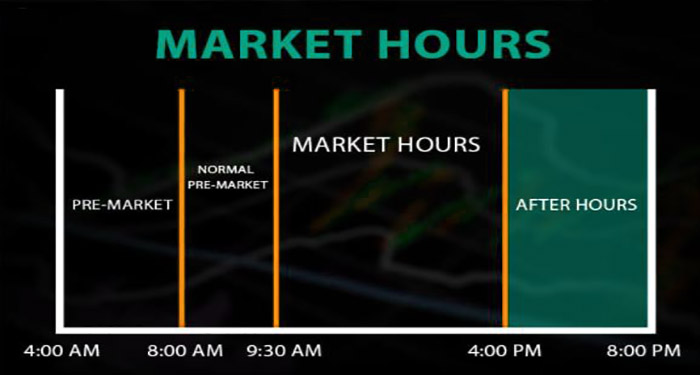The regular trading hours for the U.S. stock market are 9:30 a.m to 4:00 p.m. ET. This is the time period when the market is most liquid and therefore more receptive to traders that want to extract profits. Unfortunately, there are only two blocks of time in the regular session that are actually tradable.
You can’t just place a trade at any time and expect to earn a profit on that trade. It just doesn’t work that way because the HFT’s are going to take advantage of you nearly all the time. After all, you will be trading against a market maker (a computer algo) rather than an individual human being. Believe it or not, you can now trade before the market opens in the morning, and continue to trade once the market has closed at 4:00 PM ET. The only issue is that outside of regular markets the liquidity is much lower and stocks are much thinner. This means stocks can do crazy things which can be really good or really bad depending on if you know what you are doing or not.
After-Hours Session:
The trading that takes place after the regular stock market hours, 9:30 a.m to 4:00 p.m. ET, is referred to as the after-hours. After-hours stock trading takes place between the hours of 4:00 to 6:30 p.m. ET, although ECN’s (electronic computer networks) will actually allow you trade until 8:00 PM ET. Penny stocks do NOT trade in the after-hours although occasionally you will see some late prints on the time and sales which make it seem like the penny stocks actually trade in the after hours.
The main reason to trade in the after-hours session is that this is when companies report earnings, usually between 4:01 and 4:30 pm ET. Earnings can increase volatility in a stock which can result in huge price movements that can be good (or bad) for traders. But please be aware as a trader you never want to be holding stock into earnings (when a stock gets halted), because that is is just plain gambling. Instead, you should trade the reaction to the news. This is also the time when significant market-moving news is released which can greatly impact individual stocks. Since the intrinsic value of a stock is always moving whether the market is open or closed people want the ability to trade a stock.
Pre-Market:
Pre-market stock trading occurs before the stock market opens up for its regular hours of trading at 9:30 a.m ET. Pre-market stock trading takes place between the hours of 8:00 to 9:30 a.m. ET, however, you actually can place a trade as early as 4:00 am through an ECN if you have a direct access broker. The penny stock market actually opens at 8:00 AM ET although the volume is usually very low which means is not conducive to profitable trading. Despite this fact, if you have a direct access broker, you will have the ability to trade OTC stocks in the pre-market. Market participants like to trade in the pre-market session because they want to try to get an advantage over their competitors and react more quickly to press releases that hit the news wires while the regular market is closed.
Risks of Trading After Hours and Pre-Market:
1. Inability to see price quotes: Some brokers only allow you to view price quotes from the one trading system that they use for after-hours trading however there are many other trading venues out there. Check with your broker to see which firm quotes you will be able to see and off of which quotes you will be able to trade.
2. Lack of liquidity: During regular trading hours, market participants can easily trade with one another. During after-hours, there may be less trading volume for some stocks, making it more difficult to execute some of your trades.
3. Larger bid-ask spreads:: Less trading activity could also mean wider spreads between the bid and ask prices. As a result, you may find it more difficult to get your order executed or to get as favorable a price as you could have during regular market hours.
4. Increased price volatility: For stocks with limited trading activity, you may find greater price fluctuations than you would have seen during regular trading hours.
5. Uncertain prices: The prices of some stocks traded during the after-hours session may not reflect the prices of those stocks during regular hours, either at the end of the regular trading session or upon the opening of regular trading the next business day. This means that even if a stock price rises in after-hours trading, it may fall right back down when regular trading opens again.
6. Bias toward limit orders: Many electronic trading systems currently accept only limit orders in the pre-market and after-hours sessions which could cause you to miss out on having a trade filled.
7. Competition with professional traders: Many of the after-hours traders are professionals with large institutions, such as mutual funds, who may have access to more information than individuals…
8. Delays: As with online trading, you may run into after-hours delays or failures in getting your order executed, including orders to cancel or change your trades.
To learn the in’s and outs of trading click here
